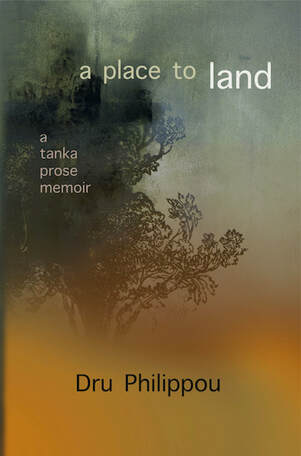
A Place to Land
Dru Philippou’s book of tanka prose, A Place to Land, offers the reader a window into her early childhood in Cyprus. Her vivid impressions of scents, flavors and wild beauty are interrupted by the chaos of the civil war between Greek and Turkish Cypriots. We follow Philippou and her family onto the ship that carries them to the safety of London. Finally, we are led to northern New Mexico, where the poet chooses her own landscape.
Writing a series of tanka prose as memoir is a challenge for even the most gifted poet. Writing an entire book is an act of bravery. Philippou is not only up for the challenge; she has created a masterpiece. Her intuitive mix of verse and prose reveal details we would otherwise miss.
the island
disappears and reappears
floating in fog
my new home
evades discovery
The moment our ship docks in Southampton, we crowd to
the upper deck as officials step aboard. They instruct us in a
language we don’t understand.
The movement from verse to prose offers both musicality and factual details allowing the reader deeper insight into the poet’s private experiences. We are less observers than participants. Philippou transcends the personal by including us in her finely drawn imagery.
horns drown out
the screeching
of wind-battered gulls
the shouts of immigrants
clinging together
A Place to Land is divided into three sections, seamlessly taking the reader from war-torn Cyprus to London, and later to New Mexico. In sections one and two, we are introduced to Greek “Goddesses” and “Gods,” as well as more immediate deity found in the form of family and friends.
a curfew siren
louder than cowbells--
my father lifts me
from the herd
to the safety of home
In the book’s final section, “Communion,” Philippou mimics her parents’ search for a new land, an entirely foreign place to call home. Settled in New Mexico, she asks the question that haunts each of us.
in a hundred years
who will see my imprint
who will know
I knelt at the edge
of this river
It is impossible to choose a favorite line or tanka prose from this rich collection. Whether eavesdropping on her conversation with a hermit monk or watching her kayak glide through a narrow channel, I am equally captivated. Without artifice Philippou beckons us backwards to our own memories, and forward to the inevitability of joining our own shadow.
Going down, I dislodge a rock that seems to roll toward the
edge forever.
a tetrapod
joins its shadow
on the shore
lapping waves
beckon it back
A Place to Land can be read strictly as memoir, but the magic is in the dance between tanka and prose. Philippou’s precise mastery of the form secures her place in the tradition of tanka prose writers. Anyone taking part in the world of Japanese literary forms, whether writer or reader, will quickly recognize that Philippou has created a definitive work. And she is an original, which makes for tanka prose that follow tradition while giving it new life. A Place to Land will be read and discussed for years to come.
Colette Jonopulos, Editor
Tiger’s Eye Press
June 5, 2022
https://www.amazon.com/Place-Land-Twww.amazon.com/Place-Land-Tanka-Prose-Memoir/dp/B09VWP4C6Ganka-Prose-Memoir/dp/B09VWP4C6G
https://hsa-haiku.org/haibunawards/haibun-2021.htm
